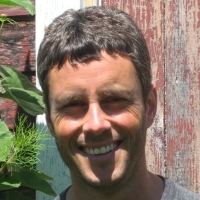 (HOST) With the Iraq War a daily staple of today’s news diet, commentator Bill Shutkin has begun to reconsider the War’s impact, not only on Vermont’s soldiers but on the state’s very identity.
(HOST) With the Iraq War a daily staple of today’s news diet, commentator Bill Shutkin has begun to reconsider the War’s impact, not only on Vermont’s soldiers but on the state’s very identity.
(SHUTKIN) Driving through a picturesque Vermont village the other day, I experienced a kind of dissonance that starts in your brain and ends in your fingertips.
It was a damp autumn morning, the colorful foliage of the surrounding hills blanketed by low clouds. Parents were dropping off their kids at the local preschool. An elderly man with a stack of letters walked toward the post office. And sandwich boards throughout the town announced the upcoming craft fair. It could have been any Vermont town.
Meanwhile, the news was on the radio. As usual, it was all about the Iraq war, the bombings, the political jousting over exit strategies, the incalculable expense to the U.S. in dollars and reputation. Maybe it was the kids, or the craft fair, but something about the contrast between a day in the life of a small Vermont town and a day in the life of Iraq disoriented me, made me uneasy.
I remembered that right after September 11, President Bush urged us to get on with our normal lives, to return to our shopping malls, soccer fields and sunny vacations as if nothing had changed. We took his advice, and then some. Now, six years removed from that fateful date, the difference between victim and victimizer has become unclear to me.
Writing about the war in Harper’s magazine recently, Northeast Kingdom resident Garret Keizer said, "The unconscionable underside of our normal existence is that while [w]e get on with our lives, they" – our soldiers, the Afghanis, the Iraqis-"get on with their deaths."
The simple fact is that Vermont has the highest U.S. military per capita death toll rate in the war, 60 percent higher than for soldiers from urban areas. That morning, I realized that among the many casualties of the Iraq War are the craft fairs, antique shows and country stores we associate with peaceful, pastoral Vermont. For me at least, the war has transfigured them, like a tornado transfigures anything in its path. They now seem beside the point or worse, mere distractions, shielding us from the sickening reality of our own loss, our own destruction.
Talk about dissonance. On one side, there’s Vermont the maple syrup state, the skiing state, the craft fair state. On the other, Vermont, the death toll state.
Garret Keizer went on to propose a general strike against the war, but I’m not sure that idea is practical. I kind of like what the guy in Warren did on Route 100 recently, with flags representing each Vermont soldier killed in the war. And I imagine next fall, at the peak of foliage season, as the craft fairs and art shows carry on, signs and sandwich boards on our town greens and along our roadsides commemorating Vermont’s fallen.
Bill Shutkin is a Partner of the Innovation Network for Communities and a Research Affiliate at MIT.